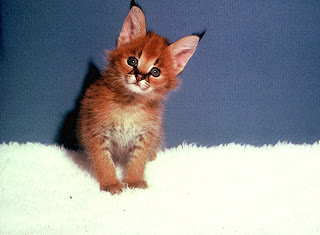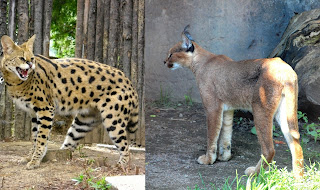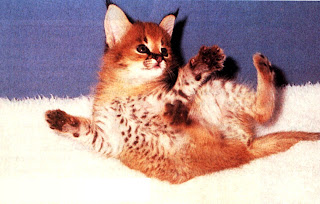A delightfully cute servical (serval x caracal hybrid) kitten (Dr Warren D. Thomas)
Many different hybrids between the smaller species of wild cat have been recorded over the years, but I would like to mention one particular interspecific (indeed, intergeneric) cross featuring smaller cats here - because, as far as I am aware, when I originally included details of it in the article of mine (Wild About Animals, February 1996) on which this ShukerNature blog post is based, it was the first time that a successful mating between these two species had ever been documented.
A serval, left; and a caracal, right (both public domain)
In 1993, Dr Warren D. Thomas informed me that a few years earlier, while he was director there, a litter of four feline hybrids was born at Los Angeles Zoo, sired by a serval Leptailurus serval and born to a caracal Caracal caracal. This very unusual mating took place quite by accident, while the two cats were participating in an educational programme.
Servical kittens have BIG ears! (Dr Warren D. Thomas)
Two of the four cubs died in the first 10 days after their birth; the other two survived, but at the age of 8 months they were given away to a local animal sanctuary. As cubs, these 'servicals' resembled sandy-brown balls of fur, with two enormously broad ears like those of their serval father yet bearing distinctive tufts at their tips like their caracal mother's. When adult, they would probably have been fox-sized, bearing in mind the adult size of servals and caracals.
A playful servical kitten (Dr Warren D. Thomas)
Since then, the reverse cross, between a male caracal and a female serval, has also been recorded with captive specimens. The resulting hybrids are known as caravals.
Providing further evidence that the serval is not as reproductively isolated from other cats as was once thought, a new ‘domestic’ breed of cat has been developed by crossing the serval with domestic cats F. catus. The result of this unexpected hybridisation is a very eyecatching breed termed the savannah, which is now popular in the USA. As might be expected from such a cross, the savannah is a very sizeable animal. One such specimen, a female called Mecca, was 18 in tall when sitting. Similarly, a male called Harley, kept as a pet in America during the late 1990s, weighed over 20 lb when only 9 months old, and could leap over a decent-sized settee in a single bound.
A savannah cat (public domain)
Savannahs look very like servals, sporting their characteristic pelage of blotches and polka dots, but are said to be very affectionate pets, playing with normal domestic kittens, enjoying human company, and purring like a normal domestic cat.
This ShukerNature blog is excerpted from my book Cats of Magic, Mythology, and Mystery: A Feline Phantasmagoria (CFZ Press: Bideford, 2012).

























I'm sort of surprised that we haven't heard much about hybridization until recent times.
ReplyDeleteAt any rate, the kittens are so cute! Who says big ears aren't attractive?
Adooorable kittens!
ReplyDeleteSavannahs make affectionate pets? I'm not surprised. I once read an article about keeping actual servals as pets. It went to considerable lengths to emphasise that they bond to their owners, so that even more than dogs, "A [serval] is for life, not just for Christmas." You can't give the animal away, it will be seriously heartbroken! Maybe I should post this on the animal grief page; got a couple of other bits to go with it. Anyway, as pets, servals retain the energy of kittens but (obviously) grow larger than domestic cats. Not a pet to be taken on lightly by any means.
Are these hybrids, like mules, sterile?
ReplyDeleteSadly, I can't give you an answer to your question, as no contact was maintained between the zoo and the animal sanctuary that received these cat hybrids, and I am not aware of any other serval x caracal crossbreeds.
Delete